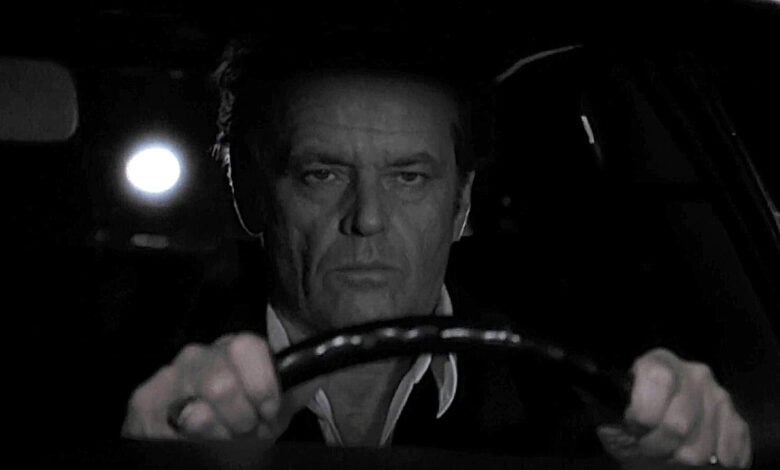
Sean Penn’s “The Crossing Guard” (1995) marked the star’s second film as writer/director (the first being 1991’s “The Indian Runner”) and his first collaboration with Jack Nicholson.
The film arrived with critical acclaim that was lost in a busy Christmas movie season (the likes of “Toy Story,” “The American President,” Goldeneye” and “Ace Ventura: When Nature Calls” dominated the movie month). If you’re a fan of Nicholson, it’s a major find and an underestimated work.
Nicholson stars as Freddy, a jewelry store owner with a self-destructive night life and a temper that easily comes to the surface. He’s a character who fascinates as much as he seems unpleasant and quite dangerous.
One morning, Freddy randomly shows up at the home of Mary (Anjelica Huston), his ex-wife, causing a ruckus and putting everyone on edge. His extraordinary reason for suddenly appearing: Freddy has learned that the man responsible for the death of their daughter is getting out of prison soon and Freddy happily announces that he’s going to kill him.
We meet the ex-con, who goes by John Booth (David Morse) and has a reserved way of dealing with people. Freddy turns up at John’s trailer, puts a gun in his face and warns him that his days are numbered.
Penn’s flawed, self-indulgent film has terrific performances and powerful scenes that elevate it over the missteps. There’s too much slow motion, too many stripping scenes (yes, a movie can have too many of those) and an opening that doesn’t work.
Once we get to the scene where Freddy confronts Mary for the first time in years, which is also Nicholson’s first scene with Huston, the plot is set firmly in motion. In fact, this potent encounter, an incredible scene, ought to have been the film’s opener as well.
Nicholson’s ferocious yet vulnerable turn is another acting milestone, while Huston has fewer scenes but always matches him in focus, honesty and intensity.
I liked Morse’s straightforward turn, Robin Wright’s utterly natural acting and was delighted to see Robbie Robertson and John Savage turn up and acquit themselves well.
Another major plus is Bruce Springsteen’s “Missing,” a thrilling, beautifully written song he wrote for the film that doesn’t sound like anything he’s done before (likewise, Springsteen’s fantastic “Lift Me Up,” another out of character jewel that he wrote for John Sayles’ superb 1999 drama “Limbo”).
Penn’s subsequent and final collaboration with Nicholson, “The Pledge” (2001), even with its hard-to-take ending, is preferable to “The Crossing Guard.” If anything, “The Crossing Guard” kind of feels like a tryout for the uncompromised darkness of their second and superior vehicle.
The upbeat finish that Penn’s arrives at in “The Crossing Guard” may have felt like a welcome, even commercially preferable touch, but I still find the final scene impossible to buy.
Material this unpleasant needs more focus, less side characters and fewer cliched journeys into urban muck. The best scenes here reflect universal dread and find truth in character details, while the worst feel like Penn is trying too hard and being too obvious in his efforts to mimic the anguish of John Cassavetes.
Freddy’s late-night phone call to Mary and the scene that follows (again, Nicholson and Huston give master class work here) are so extraordinary, it salvages the scenes that don’t work or feel underdeveloped.
Nicholson, who had just previously stolen “A Few Good Men” (1992) for Rob Reiner and donned fur and fangs in “Wolf” (1994) for Mike Nichols, gives Penn and us the kind of emotionally generous, painfully vulnerable and searing performance that marks some of his best work.
Nicholson will always be celebrated for his acting in movies like “The Shining” (1980) and “The Departed” (2006), but he’s also the star of “About Schmidt” (2002), “Ironweed” (1987), “Carnal Knowledge” (1971) and “Chinatown” (1974),
Yes, Nicholson’s performances can be stylish and showy, but he can also dig deep and deliver frank, unflattering and startlingly real work.
His performance in “The Crossing Guard” is up there with his very best.
Penn’s finest work as a director remains his terrific adaptation of “Into the Wild” (2007). As is, Penn’s efforts here, to make the kind of character driven, commercially tone deaf, ’70s era drama that Nicholson might have made in his “Five Easy Pieces” (1971) days (there’s even a scene here with a waitress and a ring that mimics his chicken salad scene from that movie) are strong enough to recommend but hit and miss.
The acting, overall and individual moments in “The Crossing Guard” give it a power that lingers afterwards. Yet, as much as this little-seen Nicholson vehicle needs to be rediscovered, it’s “The Pledge” where Penn and Nicholson go full dark and emerge triumphant.
